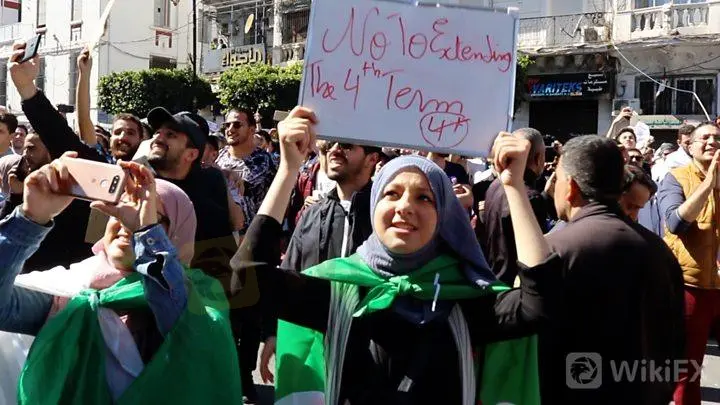简体中文
繁體中文
English
Pусский
日本語
ภาษาไทย
Tiếng Việt
Bahasa Indonesia
Español
हिन्दी
Filippiiniläinen
Français
Deutsch
Português
Türkçe
한국어
العربية
Algeria army urges removal of President Abdelaziz Bouteflika
Abstract:Image copyrightAFP/GettyImage caption President Abdelaziz Bouteflika has led Algeria since 1999 Alg
Image copyrightAFP/GettyImage caption
President Abdelaziz Bouteflika has led Algeria since 1999
Algeria's army chief of staff has demanded President Abdelaziz Bouteflika be declared unfit to rule after weeks of protests against him.
Speaking on television, Lt Gen Ahmed Gaed Salah said: “We must find a way out of this crisis immediately, within the constitutional framework.”
The president has already agreed not to stand for a fifth term in upcoming elections, which have been delayed.
Demonstrators accuse the 82-year-old of a ploy to prolong his 20-year rule.
Talks have been set up to oversee the country's political transition, draft a new constitution and set the date for elections. But they do not yet have a date to start.
How does reclusive President Bouteflika run Algeria?
Beating the president not enough for protesters
Protests against Mr Bouteflika began last month after the president, who has rarely been seen in public since suffering a stroke in 2013, said he planned to stand for another term.
But people have continued to march even after he agreed not to stand, instead demanding immediate change.
Lt Gen Gaed Salah - who is also deputy defence minister and seen as loyal to Mr Bouteflika - has previously said the military and the people had a united vision of the future, hinting at the armed forces' support for the demonstrators.
What did the army chief say?
Lt Gen Gaed Salah said the constitution was “the only guarantee to preserve a stable political situation”, and called for the use of Article 102, which allows the Constitutional Council to declare the position of president vacant if the leader is unfit to rule.
“This solution achieves consensus and must be accepted by all,” he said to the applause of officers watching the speech.
Under the constitution, the head of the Senate, Abdelkhader Bansallah, would become the acting head of state until an election could be held.
Reports suggest the Constitutional Council is now holding a special meeting after the speech.
The dramatic intervention by the armed forces chief of staff is the latest development after weeks of sustained protest in Algeria.
Earlier this month Prime Minister Ahmed Ouyahia announced his resignation and was replaced by Interior Minister Noureddine Bedoui.
A significant intervention
By Rana Jawad, BBC North Africa correspondent
The announcement by Algeria's army chief is symbolically significant. However, given the reality of President Bouteflika's health status, the constitutional impasse over an extension to his current mandate until elections are held, and the rallying calls by protestors who remain on Algeria's streets, the move is hardly unexpected.
Still, there will be questions over the army's chief's motivations. In recent years, it is the president's circle of political and army loyalists who appear to have spoken on his behalf as his absence peaked due to illness.
Lt Gen Ahmad Gaed Salah is viewed as fiercely loyal to Mr Bouteflika and a central “pillar” to the ruling powers of Algeria - so much so that on the weekend, a privately-owned local newspaper reported that he “must go” along with the president.
The country's Constitutional Council will need to back this latest call, and then ultimately it will be left to the parliament to officially decide the president's political fate.
Who is Abdelaziz Bouteflika?
A veteran of Algeria's war of independence, Mr Bouteflika's upper-class, Westernised style led him to be called “the dandy diplomat” in some quarters.
He came into office, backed by the army, after the 1990s civil war and was largely viewed as a unifier of the many factions underpinning Algerian politics.

Media playback is unsupported on your device
Media captionHalf of Algerias population is under the age of 30.
Unlike some leaders in the region, his presidency survived the protests of the Arab Spring in 2011 - until now.
He does not travel around the country or abroad, except for medical treatment.
His aides represent him at events and read his messages to the public, and the announcement that he was not standing for a fifth presidential term was read on his behalf by a newsreader on national TV.
Disclaimer:
The views in this article only represent the author's personal views, and do not constitute investment advice on this platform. This platform does not guarantee the accuracy, completeness and timeliness of the information in the article, and will not be liable for any loss caused by the use of or reliance on the information in the article.
WikiFX Broker
Latest News
Why is there so much exposure against PrimeX Capital?
Russia to Fully Ban Crypto Mining in 10 Regions Starting January 1, 2025
Two Californians Indicted for $22 Million Crypto and NFT Fraud
WikiFX Review: Is Ultima Markets Legit?
Colorado Duo Accused of $8M Investment Fraud Scheme
What Impact Does Japan’s Positive Output Gap Have on the Yen?
RM62k Lost Investment Scam After Joining XRP Community Malaysia on Telegram
Victims of Financial Fraud in France Suffer Annual Losses of at Least €500 Million
SEC Warns on Advance Fee Loan Scams in the Philippines
Malaysia Pioneers Zakat Payments with Cryptocurrencies
Currency Calculator


